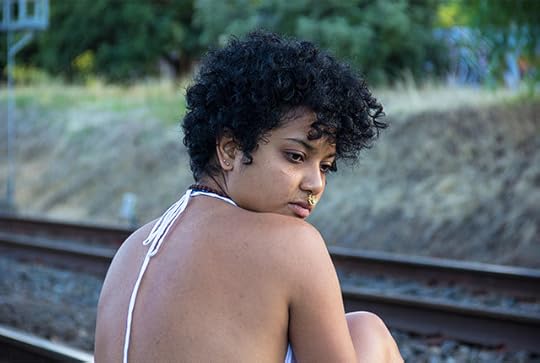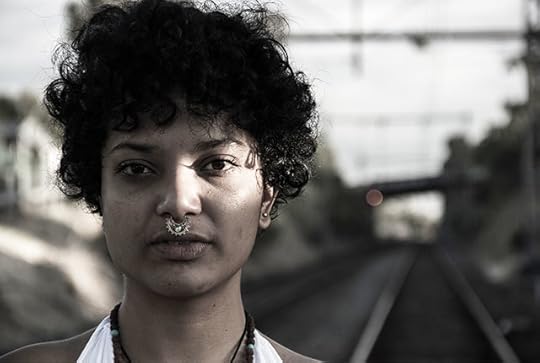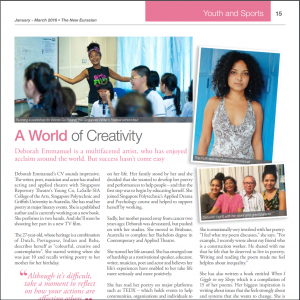ArunDitha (Deborah Emmanuel)'s Blog
May 18, 2016
Today

Deborah Emmanuel seems like a sunny enough character. The Singaporean writer is young, witty, affable and attractive. Even her rave-reviewed collection of poems is called When I Giggle In My Sleep. So when she says she has taken a short break from writing and performing her poetry to pen a non-fiction novel based on her own experiences, you wonder what she could have possibly lived through that would take a whole book to tell.
Dig a little deeper, and you’d find that this eloquent literary luminary was imprisoned at age 19 for a year under the Drug Rehabilitation Sentence (DRS). The drama school dropout had tested positive for ganja and MDMA (Ecstasy), after a night party was raided by the Central Narcotics Bureau. (Oh, and contrary to the title, When I Giggle In My Sleep is often quite melancholy and political.)
As the DRS is meant to rehabilitate young people rather than punish, the stint did not go on her permanent records. But the experience, which saw her spend six months in Changi Women’s Prison and the next six in Christian halfway house The Turning Point, left a lasting impression on Emmanuel.
“After I was freed seven years ago, I just wanted to leave the experience behind by working very hard. In order to feel comfortable as to why I had been there, I had to believe I was punished for a reason — I was wrong, and I needed to become a better person. That drove me to achieve things and pursue a more productive life,” said the 27-year-old.
“But at some point, I realised it was still affecting me — in the way I view the state, authority, the law. If I had to talk to even security at airports, I would get really affronted and unconsciously have my ‘bitch face’ on,” she added with a laugh. “I thought I was again being confronted by people who had the power to make decisions to affect my future, who thought they knew better than me.”
So rather than continuing her efforts in leaving the traumatic time behind, Emmanuel decided to capture it in writing. It wasn’t easy though.
“I tried for a long time, but I couldn’t fit a year of being imprisoned, and the really intense accompanying stimuli, into one poem,” she explained.
Then a woman at her writing group in Brisbane suggested that she document the experience in a factual account. “I was surprised at how much power my memory has, to recall little moments like me and a cellmate sitting in a corner propped against the cell door, talking about The Road Less Travelled, the book I was reading,” she shared. ”I think it had been a purge of all that memory that had been trapped inside me for so long.”
Still, she “failed miserably” at being factual. “There were all these feelings and thoughts I thought were important to say as well. That was when I realised I didn’t want to write this account just for myself, I wanted other people to be able to read it. So I got to work.”
After a year of writing and rewriting, Emmanuel’s first non-fiction novel, Rebel Rites, was completed. But she was confronted with another hurdle: She needed to fund its printing and publication. So she set up a crowdfunding campaign, and exceeded her target even before the deadline, with donations coming in from all over the world.
Emmanuel is aware the content of her book is “sensitive”, to say the least.
“You see, with the story and the way I tell the story, there are definitely some issues about the system that come up. I question the way that we rehabilitate most drug consumption offenders. We punish people who smoke marijuana or pop Ecstasy the same way as hard-drug abusers who, say, shoot up heroin — in the same way or similar ways, at least at the time I was in there,” she pointed out.
After seeing what many of the inmates experienced, she grew cynical about whether prison really gives those imprisoned a second chance. “How are you supposed to leave believing you will amount to anything?” she said, adding that she managed to carve a life for herself only because of family support.
“It’s pretty cool that my work and what I’ve achieved since seem to take precedence over my history of imprisonment … But I’m not a prison success story. I had a loving family and network behind me and that’s why I had the strength to do the things that I’ve done, despite what I went through.”
So what is Rebel Rites to Emmanuel, if not a prison success story? “It’s a story about equality,” she said.
“I come from a privileged background … There is this stratification in Singapore so you mingle with people who are the same as you,” she noted. “Prison was the only time I knew so intimately a group of people born to a completely different realm of experience: Into destitution or broken families, into drug abuse and crime. And I thought I was so different from them; I didn’t belong there. But we were feeling the same fear and sadness. We became friends. We became an ‘us’.”
“But other than this ‘us’, the majority of our population has no idea what we felt, and what we went through. And I think that’s one main reason I have written Rebel Rites.”
May 8, 2016
The Straits Times
[image error]Singaporean poet Deborah Emmanuel. PHOTO: BELLATRIX PHOTOGRAPHY
PUBLISHED
MAY 8, 2016, 10:34 AM SGT
Lydia Vasko
Freight train feet rush me to a destination,
but I am carried cargo on an endless river.
The terror of losing keeps me playing along
in orchestras of malfunctioned song.
My heart clock ticks a traffic light countdown.
My soul drum quickens to breathless heels.
The beats we build are too fast for my chest;
rush hour rage leaping too far to catch.
The peace I once had is running away
in blurred horizon, in melting line.
Why is our rhythm boxed and broken?
Why do my fingers tap binary code?
I want to listen to whispering leaves,
but you people flee like there isn’t time.
I want to stop the fall of a struggling calf,
but you people roar like bursting fire.
Let me be free from this discordant symphony,
with beasts astray on growling wheels.
Let me live far from grids and steely teeth,
crushing my windpipe with diamond leash.
I shall hide in the forest where the sound is right,
where there is no man and no machine.
I shall lie in the forest where there is no light,
and listen to beings a part of me.
March 3, 2016
Buro 24/7
[image error]
Deborah Emmanuel, one of the authors for our book reading event #BuroBookshelf opens up about her time in prison and how it led to the crafting of her upcoming title, Rebel Rites
If you’ve ever met Deborah Emmanuel, you’ll know that she’s someone impossible to forget. Never mind that her hair enters the room before she does — in fact, it was what caught my eye as we were shimmying along to a band that was playing at Neon Lights festival last year (she was also there to perform her spoken word). Image aside, the 28-year-old local author and spoken poet possesses a voice that’s hard to ignore in both written and spoken forms.
Her resume impressively details appearances at events such as TEDx, The Singapore Writer’s Festival, Bali Emerging Writers Festival and Queensland Poetry Festival. Her most recent gig was the Red and white, black and blue Australia tour which took her to cities such as Sydney, Canberra, Adelaide and Melbourne in January and February this year. When I Giggle In My Sleep, her first published collection of poetry amasses four years of material. With a confessional and lyrical voice, she touches on grief, love and violence, bringing together personal and social commentaries.
Rebel Rites is up next. Due to launch by the end of March and early April, it will detail accounts of her six months in Changi Women’s Prison and six months at The Turning Point, a Christian halfway house. On the music front, her dub/psy/reggae band Wobology’s currently recording their first studio EP, Kaleidoskopik. We catch up with the wordsmith ahead of her reading here at the Buro pop-up.

At 11, you dedicated your first poem to your mother as a birthday gift. What was the most recent poem you wrote for someone?
A few months ago I wrote a poem for my friend Mukul. He’s a migrant worker and a poet. It is called Birth’s Lottery and laments our inequality and the fact that our opportunities are different purely because we were born in different places and into different families.
How exactly did you end up in prison?
I was a 19-year-old party girl who occasionally smoked pot and took ecstasy pills. They raided the bar I was in to arrest the DJ. I was sitting at his table. I didn’t even know him but that was irrelevant because I was guilty by association. Singapore is one of those places in which you’re guilty until proven innocent.
What was your first day in prison like? Anything like Orange Is The New Black by any chance?
My first day in Changi Women’s Prison was terrifying. I was a teenage girl who ended up somewhere she never expected to. I sobbed and did what they told me to. I learned that I would sleep on the floor and be shouted at by wardens all the time…I’ve never seen Orange Is The New Black, but I doubt it is anything like Singapore prison. We never got to wear any make up, for one. Haha!
What’s the most important thing you learned about your time in prison, and how has this changed you?
I learned that my actions had consequences. Sometimes the consequences are as severe as the action, sometimes the consequences are unjust…but there are always consequences. I never expect to do something and not create a change in my environment. Sometimes that means I’m afraid to take action because of the outcome. Sometimes that means I try to change things which seem hopeless because a part of me believes that change is happening as long as I’m taking reasonable action (i.e. not involving prayers or magic spells)…even if I can’t see the change and even if it’s not measurable change.
When did you decide to turn your experiences into a book?
I was trying to write a poem for ages but it was a struggle. In hindsight, that is unsurprising (I don’t know how I expected to be able to write one poem based on a year of life-changing moments). At a writer’s group I was a part of in Brisbane someone said “Why don’t you write a factual account?”. When I started writing the account it was clear that the story needed to be told in its full form — the gravity of what I had been through and the underclass that is perpetuated by a system we allow to exist right under our noses but look away from because it doesn’t involve us.
Why the title Rebel Rites?
It’s what I decided to go with because I like alliteration and for me the words together translate to punishment, which is basically what imprisonment is (instead of healing, which is what I really think our priority should be.)
Where and how do you write?
I mostly like to write at the dining table and on my computer, sitting upright. Windows open and bright. When I started writing Rebel Rites it was at my friend’s country home in a small town in Australia. There is nothing comparable to writing in the quiet with the occasional bird call in the background and a field to run through when the words fill up too much of my head.
Tell us more about the process of writing Rebel Rites.
I edited the book a lot before I was finished then at some point had to train myself to keep writing so I could get to the end. Editing was the hardest for me because I struggled to accept that no matter what I do, it will never be good enough because nothing I write is ever good enough. My friend Divya gave me this idea about the book being a living, morphing being. It will never be complete but I have to let it live when it is time for other people to meet it.

You tackle a lot of hard-hitting issues in your work, such as being a minority in Singapore. What’s been the best response from people who’ve connected to your poetry?
I don’t know if it is the best response…but during a set on my Australia tour a woman ran out of the room crying. It was the most dramatic response I’ve received, for sure! I’m getting used to the fact that my poems make people cry and am trying to own it.
What’s the most self-fulfilling thing about being an author, and what about it makes it so compelling and beneficial to the community?
The only thing that would make me beneficial to the community is if I was only creating positive impact. The things that drive me as a writer or artist these days is mostly creating awareness and encouraging equality. The challenge for me as a writer and performer is to do those things in a way that is beautiful and engaging; in a way that makes it art as well as activism.
Lastly…when was the last time you rebelled?
I cut all my hair off a few weeks ago to rebel against myself. I had been wanting to do it for over a year but was afraid of the change and that I would feel negative about my appearance. It’s incredibly hypocritical of me because I discuss how we should disregard beauty standards in my poetry yet I was afraid to cut my hair off because I was attached to how attractive I felt with my dreads and curls. Now with the short hair, people still tell me that I look nice, and it still makes me feel nice.
I will shave my head next. The whole image thing is disgusting and confusing and I don’t know when I will figure it out, but it feels right to be thinking about these things and acknowledging that I care even though I don’t want to care. Perhaps sometime in the near future we will operate ourselves as avatars in a computer-generated world and I can just appear as a cuttlefish or something.
#BuroBookshelf is happening tonight at 7pm at the Buro Pop-up in Scotts Square with poet and authors Deborah Emmanuel, Cyril Wong and Michelle Tan.
Source: http://www.buro247.sg/culture/art-and-design/interview-with-deborah-emmanuel-rebel-rites.html
February 16, 2016
The NewEurasian
January 13, 2016
Don’t Price Me, I’m Nothing.
Lock me in a cellar and I’ll claw my way out,
birth blood from my fingers; gasp air from the gods.
Trap me in a wine bottle, I’ll drill through the cork,
when my belly is full and my teeth are stained dark.
Give me a mirror i’ll smother it in paint,
since I can’t use my mind when it’s wrapped in my face.
Hold me at ransom, I’ll swallow the telephone,
don’t price me, I’m nothing, don’t price me, I’m nothing.
My soul scrapes the pavement while running away,
can’t hammer my body in a place it will stay.
Cast me in tarmac, a statue of road,
park trucks on my madness so it has nowhere to go.
I yawn at the sun and I cry with the moon
while tree roots creep slowly, leaves wither slowly.
Carve me in bark so I know my own shape,
as my trunk breathes alive as my branches burst veins.
I look into mirrors but only see ghosts with guns in their hands.
Call me a name and I’ll be at its birthplace,
call me a name and I’ll burst from its loins,
call me a name and I’ll bury its bones
but don’t ask me to spell it, I’ll get it all wrong
the smoke screen of death can’t be moved by a song
and no fairy lights will make visions appear.
No fairy lights will make visions appear.
January 9, 2016
Skinless

What is the metaphor for this heart?

November 24, 2015
Imperfect

November 6, 2015
If I had time, I would tell you everything.

Birth’s Lottery





